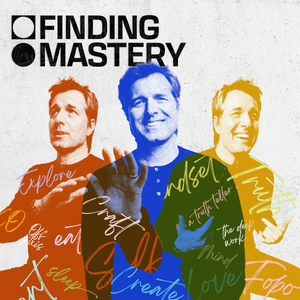
Shame vs Guilt
07/25/23 • 13 min
Shame and guilt, often used interchangeably, are different experiences with distinct effects. Guilt, the feeling we get when we’ve done something wrong, is adaptive and helpful, prompting discomfort when our actions contradict our values and facilitating self-reflection and restitution. Shame, on the other hand, is the feeling that we are what’s wrong, that we are unworthy, bad or broken. It offers no constructive or restorative path, instead opening a pit of self-deprecation and low self-esteem, with no ladder to climb out. This destructive force can lead to depression, anger and hurtful behaviour toward others, further feeding the shame cycle.
In this episode of Mentally Stronger, I help you distinguish the two feelings and delve into a potential source of persistent feelings of shame. I provide three pointers for healthier handling of both feelings, so you can foster healthier relationships with yourself and others and live in a way that promotes personal growth, happiness, and empowerment.
Key Links:
Melli O’Brien: https://melliobrien.com
The Mental Strength School: https://melliobrien.com/mental-strength-school/
Join the waitlist for Headstrong, Melli's 8-week online training course: https://melliobrien.com/headstrong-program/
Shame and guilt, often used interchangeably, are different experiences with distinct effects. Guilt, the feeling we get when we’ve done something wrong, is adaptive and helpful, prompting discomfort when our actions contradict our values and facilitating self-reflection and restitution. Shame, on the other hand, is the feeling that we are what’s wrong, that we are unworthy, bad or broken. It offers no constructive or restorative path, instead opening a pit of self-deprecation and low self-esteem, with no ladder to climb out. This destructive force can lead to depression, anger and hurtful behaviour toward others, further feeding the shame cycle.
In this episode of Mentally Stronger, I help you distinguish the two feelings and delve into a potential source of persistent feelings of shame. I provide three pointers for healthier handling of both feelings, so you can foster healthier relationships with yourself and others and live in a way that promotes personal growth, happiness, and empowerment.
Key Links:
Melli O’Brien: https://melliobrien.com
The Mental Strength School: https://melliobrien.com/mental-strength-school/
Join the waitlist for Headstrong, Melli's 8-week online training course: https://melliobrien.com/headstrong-program/
Previous Episode

How to Cling Less and Love More
Moments of perfection in our lives, whether a life-changing sunset or an unforgettable kiss, are often intruded by a common thought: “I wish this moment could last forever.” Though it’s natural to want to hold on to the things that bring us peace, joy or wonder, true enjoyment is hindered when we cling to the desire for things to remain as they are. Clinging, unlike healthy desire, involves gripping, forcing, and resisting. It brings tension, stress and heartache, prohibiting us from fully experiencing and appreciating life. But we can cultivate acceptance and appreciation for the present moment by focusing on clinging less and loving more.
In this episode of Mentally Stronger, I explain the distinction between healthy desire and clinging, and guide you in identifying what that associated tension feels like in your body and mind. I suggest a practice of softening and shifting focus to love and appreciation, creating space for more magic moments, an increased sense of love and a deeper sense of gratitude in our daily lives.
Key Links:
Melli O’Brien: https://melliobrien.com
The Mental Strength School https://melliobrien.com/mental-strength-school/
Join the waitlist for Headstrong, Melli's 8-week online training course: https://melliobrien.com/headstrong-program/
Next Episode

Seek First To Understand, Then To Be Understood
We all have a natural yearning to be understood, but effective communication requires mutual understanding. In our efforts to convey our point of view or form the perfect response, we often miss the opportunity to see another perspective, and create a defensive environment that is ripe for misunderstandings, distrust and resentments. Steven Covey offers a valuable remedy in The Seven Habits of Highly Effective People - “seek first to understand, then to be understood" - but this can be harder than it sounds.
In this episode of Mentally Stronger, I break down Covey’s advice and demonstrate practical steps to promote more mindful, non-judgemental and deep listening. When we truly hear and seek to understand others, we set up the conditions for mutual trust, care and respect, making it more likely that, when it's our turn to speak, we’ll be afforded the same courtesy.
Key Links:
Melli O’Brien: https://melliobrien.com
The Mental Strength School: https://melliobrien.com/mental-strength-school/
Join the waitlist for Headstrong, Melli's 8-week online training course: https://melliobrien.com/headstrong-program/
If you like this episode you’ll love
Episode Comments
Featured in these lists
Generate a badge
Get a badge for your website that links back to this episode
<a href="https://goodpods.com/podcasts/deep-resilience-289580/shame-vs-guilt-37471947"> <img src="https://storage.googleapis.com/goodpods-images-bucket/badges/generic-badge-1.svg" alt="listen to shame vs guilt on goodpods" style="width: 225px" /> </a>
Copy





